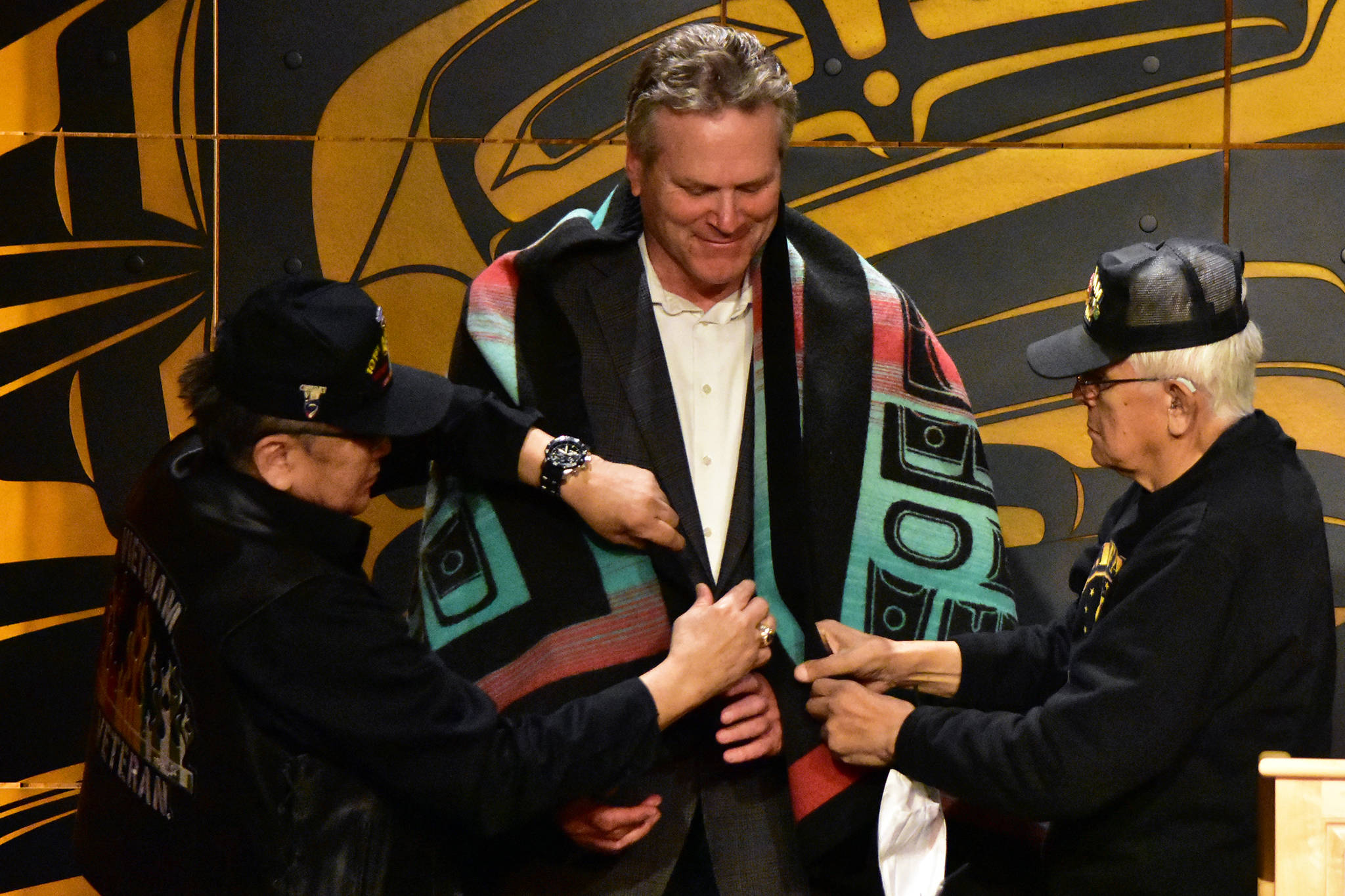Gov. Mike Dunleavy and several state lawmakers are proposing the state transfer lands to Alaska Native Vietnam War veterans after a decision from the Department of the Interior delayed a similar transfer of federal lands.
The issue goes back decades, the governor said at a press conference at the Walter Soboleff Building in downtown Juneau, and the state is using the opportunity to fulfill a promise to Alaska Native veterans.
“We can’t undo what happened in the past,” Dunleavy said, standing in front of several veterans wearing baseball caps adorned with mission flags and commendations from the Vietnam War. “We’re not going to wait any longer, we can’t wait any longer, this is a moral imperative.”
Under an amendment the governor is submitting to two bills currently in the Legislature, Alaska Native veterans would be able to exchange federal land made available to them under a 2019 law for other lands identified by the state. Many of the lands offered to veterans are far from where they actually live, the governor said, and the amendment would give them the opportunity to select lands closer to their homes.
[Program allows some Alaska Native Vietnam vets to get land]
There are no lands within the Tongass National Forest selected by the federal government for transfer, Dunleavy’s acting Chief of Staff Randy Ruaro gave as an example, but under the proposal, veterans could apply for federal lands elsewhere and exchange it for state land closer to home. Some of the lands selected for transfer to Alaska Native veterans were put under a stay when the new Secretary of the Interior Deb Haaland, the first Native American to hold that position, paused all orders from the Trump administration. But that only applied to land in the North and Northeastern regions of the state, Ruaro said, and there was still federal land immediately available to veterans.
Alaska Native veterans have been trying to get land for decades, said George Bennett, an Alaska Native U.S. Army veteran who served in Vietnam from 1966-68. But when he and many other veterans returned from Vietnam, land allotments were the last thing on their minds, he said.
“Most of us didn’t want to be bothered because we were dealing with so many demons,” Bennett said. “I was told I could apply for lands, but at the time it didn’t seem important.”
In 1906, Congress established the Alaska Native Allotment Act, according to a statement from the governor’s office, promising Alaska Natives tracts of vacant, unappropriated and unreserved non-mineral land of up to 160 acres if they could prove continuous use and occupancy of the land for five years.
The program’s original restrictions prevented many Alaska Natives from applying until the 1960s, the governor’s office said in a news release, a time when many Alaskans were deploying. About 13,000 land allotments were awarded in the 1960s but the program was ended following the passage of the Alaska Native Claims Settlement Act in 1971, before many Alaska Native veterans returned.
The land will be made available to Vietnam War-era veterans or their families, Dunleavy said, and is an attempt by the state to right a wrong that was done to Alaska Native veterans.
Bennett and the other veterans present gave their thanks to the governor and the Legislature for taking up the issue. Sealaska Heritage Institute President Rosita Worl also thanked the governor for his efforts and presented Dunleavy with a ceremonial blanket that was laid over his shoulders.
“When we went to Vietnam we compromised a good life, but then when we came home there was nothing there in return,” Bennett said. But this opportunity changed that, he said.
“It gives us strength again, having to go through something like this is actually medicine to our soul,” Bennett said.
• Contact reporter Peter Segall at psegall@juneauempire.com. Follow him on Twitter at @SegallJnuEmpire.

